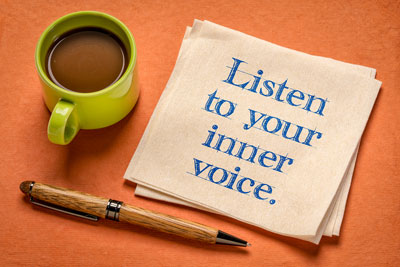Thoughts on Excellence Free E-Newsletter Series
Volume 19, Issue No. 12b
April 15, 2021
By Dan Coughlin

Like a bird’s nest your intuition is built one twig at a time.
Over the course of your lifetime, you have assembled a wide variety of insights on what you think is right and wrong, appropriate and inappropriate, and important and not important. The compilation of these insights makes up your intuition. Your intuition becomes something very real even though it’s intangible.
Your intuition is not an idea that pops into your mind while taking a shower. That is merely a spark of inspiration. It’s a single idea for you to consider in light of all that you have learned. Your intuition is much, much deeper than a single idea.
How Your Intuition is Developed
Your intuition consists of the various perspectives you have developed over your lifetime. There are two ways to hone your intuition into something valuable: contemplation and experience.
Contemplation happens when you step off the train of activity and you reflect on a topic. You can do this by yourself or with other people. You’re thinking through the topic, the options, the ramifications, the impact on yourself today and in the future, and the impact on other people today and in the future. You listen to or read other people’s thoughts, and you take those into consideration as you work through the ideas toward landing on your own perspective. Once you land on your perspective, then you can add it to all the other perspectives you have accumulated in your lifetime.
Enhancing your intuition through your experience is when you do something and then look back and discern what you learned from that experience. For example, when I give a workshop or an executive coaching session, I will look back and identify what was effective and what was not effective. And I will store that piece of insight in my journal and in my brain. The next time I come to explain that topic I will make an adjustment based on what I learned in the previous workshop.
The same thing happens for us in social situations. If we try to make a funny comment, and it ends up generating a pretty significant positive or negative response from the group, then we gain an insight. We add that insight into our brain, and we draw on that insight in a future social setting.
Another way to leverage experiences is to study the recorded experiences of other people and what insights they developed from their experiences. This is what science and empirical evidence are all about. Someone tests an idea through an experiment, which is a real-life experience, and then records what insight was garnered. Then you study the results of those experiences, and you add more insights to your brain.
Over time you will accumulate many insights and perspectives from contemplation and experiences.
Make a Decision to Trust Your Intuition
When you are faced with a situation that requires you to make a decision, your intuition becomes like a high-powered computer weighing the different options, culling through the different insights and perspectives you have accumulated over your lifetime, and presenting you with an answer.
Then it’s up to you to trust your intuition or ignore what it is telling you.
You could wait for more facts and more evidence and more people to tell you what to do. You could wait for others to try out what your intuition is telling you to do and see how their results turn out. You could do mountains of research until you are 99.99% sure that what you are thinking about doing is definitely the right thing to do and that it is going to definitely produce the results that you want.
Or you can trust the accumulated insights that you have within yourself and move forward with what your intuition is telling you to do.
Really effective people have invested a lot of time and effort in contemplation and experiences to strengthen their intuition, and then they trust their intuition in moving forward with what it is telling them to do.
Republishing Articles
My newsletters, Thoughts on Excellence, have been republished in approximately 40 trade magazines, on-line publications, and internal publications for businesses, universities, and not-for-profit organizations over the past 20+ years. If you would like to republish all or part of my monthly articles, please send me an e-mail at dan@thecoughlincompany.com with the name of the article you want in the subject heading. I will send you the article in a word document.




